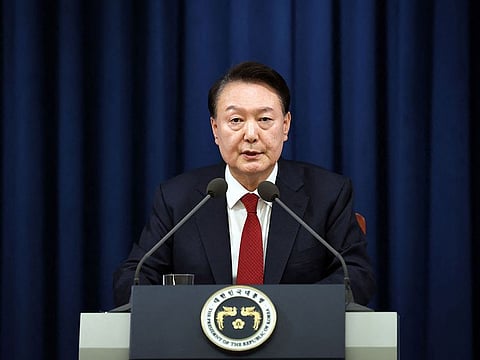Calls grow for South Korean President to resign after Martial Law chaos
Political chaos ensues after Yoon's failed attempt to impose Martial Law

South Korean President Yoon Suk Yeol’s political standing faces growing uncertainty after a dramatic series of events late Tuesday night. Yoon declared martial law but reversed the decision just hours later amid intense backlash from lawmakers and citizens.
Pressure is mounting on the South Korean leader to step down following his failed attempt to impose martial law, which caused political chaos and public outrage.
US Secretary of State Anthony Blinken welcomed the lifting of South Korean martial law, urging that disputes be "resolved peacefully", according to an AFP report.
Ruling party head: Martial law attempt 'tragic'
Meanwhile, the leader of South Korea's ruling party on Wednesday described President Yoon Suk Yeol's attempt to impose martial law as "tragic", calling for those involved to be held accountable.
"The president must directly and thoroughly explain this tragic situation," People Power Party leader Han Dong-hoon told reporters in a televised broadcast, adding that "all those responsible must be held strictly accountable."
Opposition party's move
On Wednesday (December 4, 2024), the opposition Democratic Party threatened to impeach Yoon if he doesn’t resign.
Yoon's chief of staff and several senior officials have already stepped down, and the country’s largest labour union announced plans to strike until Yoon leaves office.
The controversy comes as Yoon’s approval ratings remain fragile, plagued by scandals and political deadlock. Before the incident, a Gallup Korea poll showed his approval at just 19 per cent.
Timeline of events
Tuesday, 11 p.m. local time:
Yoon declared martial law, accusing the main opposition Democratic Party of engaging in pro-North Korean and anti-state activities. The declaration was prompted by the opposition’s actions to impeach top prosecutors and reject a government budget proposal.
Emergency National Assembly Session:
Lawmakers convened overnight, with 190 out of 300 National Assembly members voting unanimously to block the decree.
Wednesday, 5 a.m. local time:
Yoon announced he would reverse the martial law declaration. He stated that troops deployed to enforce the order were being withdrawn but defended his initial justification for the decree.
Cabinet Action:
Yoon’s cabinet formally voted to lift the martial law order.
Context, implications
This is the first martial law declaration in South Korea since 1980, during a nationwide uprising led by students and labor unions. Martial law typically suspends normal political activities, including National Assembly sessions, protests, and rallies. Yonhap News Agency reported that the decree also prohibited actions such as “denying free democracy,” attempting subversion, spreading “fake news,” or “manipulating public opinion.”
Justification for Martial Law
Yoon claimed the martial law declaration late Tuesday that it was necessary due to the Democratic Party’s moves to impeach prosecutors and reject the government’s budget.
Protests outside the National Assembly
By Wednesday morning, about 100 protesters gathered outside South Korea’s National Assembly, demanding Yoon’s resignation.
They shouted slogans like “Arrest Yoon Suk Yeol” and called for his impeachment. Despite lifting martial law hours after it was declared, Yoon faces growing public anger.
A strong police presence remains around the National Assembly after overnight protests.
Scandals and controversies
This isn’t the first time Yoon has faced calls to step down. His popularity has been declining due to several controversies, including one involving his wife, First Lady Kim Keon Hee.
She was accused of accepting an expensive handbag, allegedly violating South Korea’s anti-graft laws. Though prosecutors decided not to charge her, the incident damaged Yoon’s reputation.
A divisive leader
Yoon, a former prosecutor, became president in 2022 after narrowly defeating his opponent. Since taking office, he has taken a hard stance against North Korea, calling for a stronger military.
But at home, he’s faced opposition from the Democratic Party, which has repeatedly blocked his policies.
Yoon’s martial law attempt has further eroded his already shaky support.
Sign up for the Daily Briefing
Get the latest news and updates straight to your inbox


